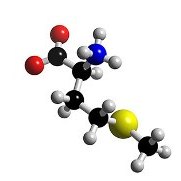Organic broilers need more methionine

The Animal Sciences Group from Wageningen University published a new report covering the results of a performance trial to determine the effect of dietary crude fibre (CF) and methionine contents on performance and slaughter quality in organic broilers.
In organic diets, an increase of the amount of organic produced raw materials seems to result in a higher crude fibre and a lower methionine concentration. Until now, the effects of these nutritional changes on performance and slaughter quality of organic broilers are unclear. Possible interaction effects with different strains of slow growing broilers are also unknown. Wageningen University researchers therefore set up an experiment to be able to develop 100% organic diets that not negatively affect performance and welfare of broilers.
Decreased growth and feed intake
From the study with 1680 slow growing broilers (1 – 70 days of age) it can be concluded that an increase of the dietary crude fibre content will decrease growth rate and feed intake of the birds. The effect of crude fibre content on feed conversion ratio, however, depends on the age of the bird.
Over the first 50 days, an increase of the crude fibre content results in a reduced feed conversion ratio, whereas this increase will improve feed conversion ratio over the last 20 days of the growth period. Over the whole growth period, crude fibre content of the diet do no affect feed conversion ratio. A reduction of the dietary methionine concentration results in a lower final weight of the broilers.
Methionine levels
Slaughter results are not affected by dietary crude fibre and methionine concentrations, but they are affected by strain. Nearly all slaughter quality parameters were reduced in Master Gris compared to JA957 broilers.
Therefore, Master Gris birds seem less appropriate for organic broiler husbandry. Finally, it was concluded that dietary crude fibre and methionine concentrations should be kept on the standard levels to maintain performance of broilers that are fed 100% organic diets.
Related website:
Related link:
For all you need to know about Animal Feed, visit www.allaboutfeed.net













